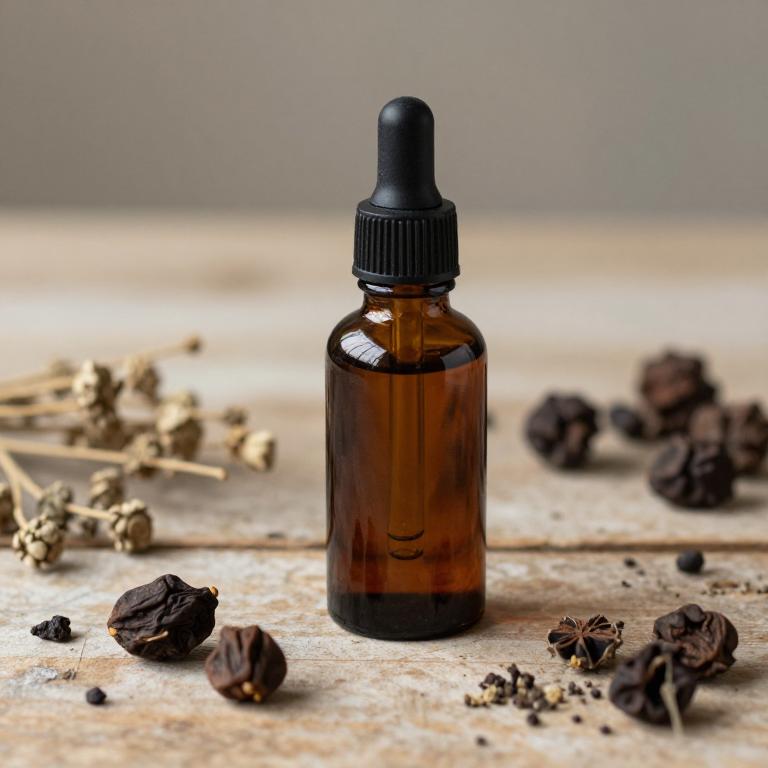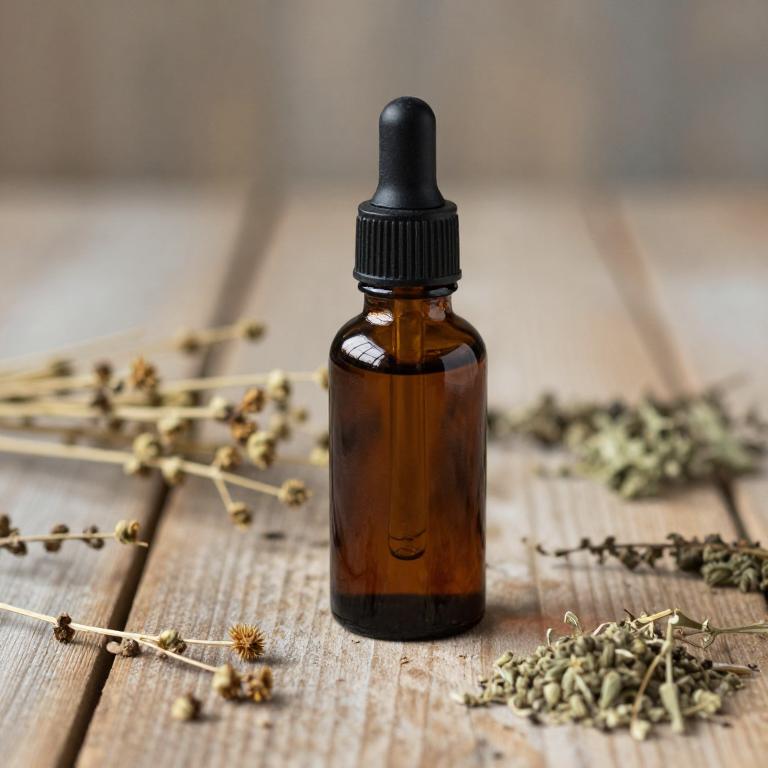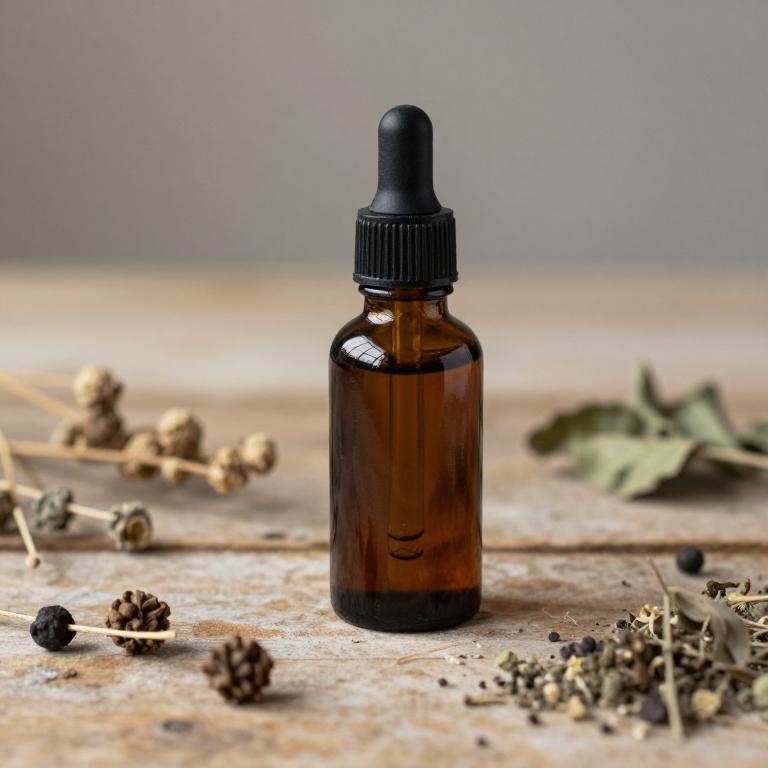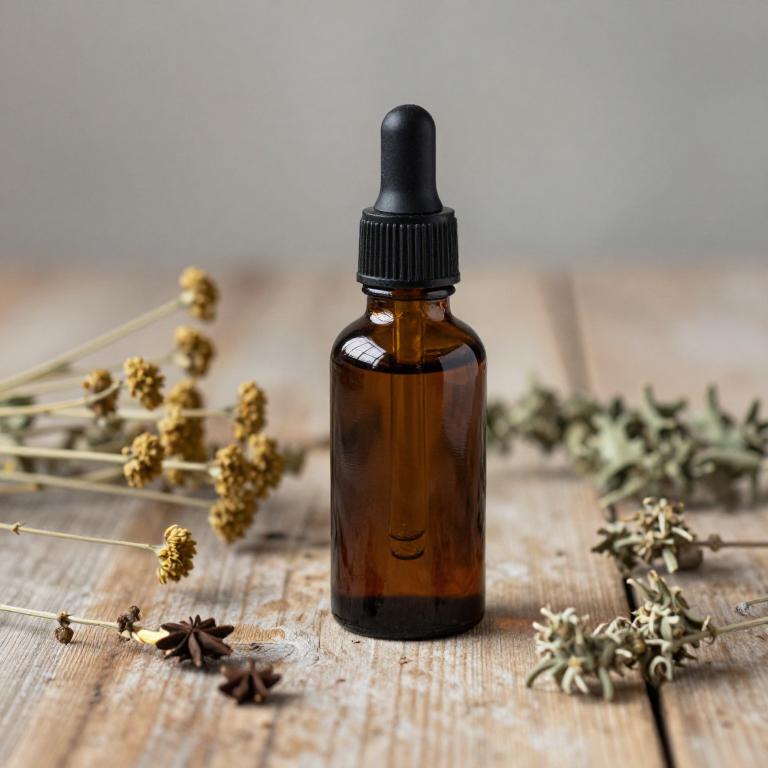10 Best Herbal Tinctures For Nausea

Herbal tinctures for nausea are concentrated liquid extracts made from various medicinal plants, designed to alleviate symptoms such as queasiness, vomiting, and digestive discomfort.
Commonly used herbs in these tinctures include ginger, peppermint, chamomile, and lemon balm, each known for its soothing and anti-emetic properties. These tinctures are often preferred for their ease of use and ability to be customized to individual needs, allowing for precise dosing. They can be taken orally, typically diluted in water or another liquid, and are generally considered safe when used as directed.
However, it is advisable to consult a healthcare provider before using herbal tinctures, especially for prolonged periods or in combination with other medications.
Table of Contents
- 1. Licorice (Glycyrrhiza glabra)
- 2. Black pepper (Piper nigrum)
- 3. Cumin (Cuminum cyminum)
- 4. Fennel (Foeniculum vulgare)
- 5. Ceylon cinnamon (Cinnamomum verum)
- 6. Dill (Anethum graveolens)
- 7. Parsley (Petroselinum crispum)
- 8. Ginger (Zingiber officinale)
- 9. Turmeric (Curcuma longa)
- 10. Peppermint (Mentha piperita)
1. Licorice (Glycyrrhiza glabra)

Glycyrrhiza glabra, commonly known as licorice root, has been traditionally used in herbal medicine for its potential to alleviate nausea.
Its tinctures are often prepared by soaking the root in alcohol to extract its active compounds, including glycyrrhizin and various flavonoids. These compounds are believed to have anti-inflammatory and antispasmodic properties that may help soothe the digestive system and reduce feelings of nausea. Some studies suggest that licorice tinctures can help calm the stomach by regulating gastrointestinal motility and reducing irritation.
However, long-term use of licorice root tinctures should be approached with caution due to potential side effects, such as increased blood pressure, and it is advisable to consult a healthcare professional before use.
2. Black pepper (Piper nigrum)

Piper nigrum, commonly known as black pepper, has been traditionally used in herbal medicine for its potential to alleviate nausea.
The tincture form of black pepper extract is often prepared using alcohol as a solvent, which helps preserve the active compounds such as piperine. Piperine, the key alkaloid in black pepper, is believed to enhance the absorption of other nutrients and may stimulate digestive secretions, potentially reducing feelings of nausea. Some studies suggest that piper nigrum tinctures may help soothe gastrointestinal discomfort and support digestion, making them a popular natural remedy for mild nausea.
However, it is important to consult with a healthcare professional before using black pepper tinctures, especially for individuals with existing health conditions or those taking medications.
3. Cumin (Cuminum cyminum)

Cuminum cyminum, commonly known as cumin, has been traditionally used in herbal medicine for its potential to alleviate nausea.
Cumin seed tinctures are often prepared by soaking the dried seeds in alcohol to extract their active compounds, which may include essential oils and phytochemicals with antiemetic properties. These tinctures are believed to help settle the stomach and reduce feelings of queasiness, making them a popular remedy for digestive discomfort. Some studies suggest that cumin may stimulate digestion and reduce gastrointestinal spasms, contributing to its efficacy in managing nausea.
However, individuals should consult with a healthcare professional before using cumin tinctures, especially if they have underlying health conditions or are taking other medications.
4. Fennel (Foeniculum vulgare)

Foeniculum vulgare, commonly known as fennel, has been traditionally used to alleviate nausea and digestive discomfort.
Herbal tinctures made from fennel seeds contain compounds like anethole, which have mild antispasmodic and carminative properties. These tinctures are often used to ease symptoms of motion sickness, morning sickness during pregnancy, and gastrointestinal upset. When taken in small doses, fennel tinctures can help soothe the digestive tract and reduce feelings of queasiness.
However, it is important to consult with a healthcare provider before using fennel tinctures, especially for pregnant women or individuals with existing health conditions.
5. Ceylon cinnamon (Cinnamomum verum)

Cinnamomum verum, commonly known as true cinnamon, has been traditionally used in herbal medicine for its potential to alleviate nausea.
The essential oils and extracts from the bark of this plant contain compounds like cinnamaldehyde and eugenol, which may help soothe the digestive system and reduce feelings of queasiness. When prepared as a tincture, Cinnamomum verum can be taken orally in small doses to provide a calming effect on the stomach. This herbal remedy is often recommended for conditions such as motion sickness, morning sickness, and digestive discomfort.
However, it is important to consult with a healthcare professional before using it, especially for prolonged periods or in combination with other medications.
6. Dill (Anethum graveolens)

Anethum graveolens, commonly known as star anise, is a traditional herb used in herbal tinctures to alleviate nausea and digestive discomfort.
The tinctures are typically prepared by soaking the dried fruit in alcohol, allowing the active compounds to be extracted for use. These tinctures are valued for their antispasmodic and carminative properties, which can help soothe the gastrointestinal tract. They are often recommended for conditions such as motion sickness, morning sickness, and digestive upset.
However, it is important to consult a healthcare professional before use, especially for pregnant individuals or those with existing health conditions.
7. Parsley (Petroselinum crispum)

Petroselinum crispum, commonly known as parsley, has been traditionally used in herbal medicine for its potential to alleviate nausea.
Herbal tinctures made from parsley are often prepared by soaking the dried leaves in alcohol to extract their active compounds. These tinctures are believed to support digestion and ease symptoms of motion sickness, morning sickness, and gastrointestinal discomfort. The essential oils in parsley, such as apiol and limonene, may contribute to its antiemetic properties.
While more research is needed, many individuals find parsley tinctures to be a natural and effective remedy for managing nausea.
8. Ginger (Zingiber officinale)

Zingiber officinale, commonly known as ginger, has been widely used for centuries to alleviate nausea and digestive discomfort.
Ginger herbal tinctures are concentrated liquid extracts that capture the essential oils and active compounds of fresh ginger root, making them a potent natural remedy. These tinctures are often used to treat morning sickness, motion sickness, and nausea associated with chemotherapy or gastrointestinal disorders. Their effectiveness is attributed to compounds like gingerol and shogaol, which help reduce inflammation and soothe the digestive system.
Due to their ease of use and portability, ginger tinctures are a popular choice for individuals seeking a natural and effective solution for nausea.
9. Turmeric (Curcuma longa)

Curcuma longa, commonly known as turmeric, has been traditionally used for its anti-inflammatory and digestive properties, making it a popular ingredient in herbal tinctures for nausea.
These tinctures typically contain curcumin, the active compound responsible for turmeric's therapeutic effects. Studies suggest that curcumin may help alleviate nausea by reducing gastrointestinal inflammation and improving digestion. When taken in appropriate doses, turmeric tinctures can be a natural and effective remedy for mild to moderate nausea.
However, it is important to consult a healthcare professional before use, especially for individuals with existing medical conditions or those taking other medications.
10. Peppermint (Mentha piperita)

Mentha piperita, commonly known as peppermint, is widely used in herbal tinctures to alleviate nausea due to its calming and digestive properties.
The tinctures are typically prepared by steeping fresh or dried peppermint leaves in alcohol, which helps extract the essential oils and active compounds like menthol and piperine. These compounds work by relaxing the gastrointestinal muscles and reducing the sensation of nausea, making the tinctures effective for conditions such as motion sickness, morning sickness, and digestive discomfort. Peppermint tinctures are often preferred over other forms of herbal remedies because they are easy to dose and have a long shelf life.
However, they should be used with caution, especially in individuals with asthma or gastrointestinal disorders, as they may cause adverse reactions in sensitive populations.